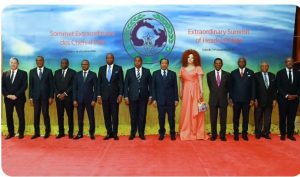
Production and regular dissemination of reliable and complete budgetary, economic and financial data; tightening of convergence criteria; placed under budgetary adjustment; prudent debt management; sub-program entry of all countries in the sub-region with the IMF in order to benefit from budgetary support, etc., are among other drastic measures that the heads of state adopted under the watchful eye of the representative of the director general of this multilateral institution during the emergency meeting in Yaoundé held on December 16, 2024.
The extraordinary summit of heads of state of the Community of Central African States (CEMAC) kept its promises. If not all the community crowned heads made the trip to Yaoundé, the heated debates at the preparatory meeting for the December 14 summit held at the Cameroonian Ministry of the Economy already augured the tone of the final communiqué. Thus, the heads of state, without embellishment, recognize the seriousness of the situation that the sub-region is going through and call for the pursuit of a coherent and coordinated regional strategy to preserve the viability of public finances, bruised by budgetary slippages having resulted in a mortgage of the budgetary support expected from the Fund by Cameroon, the CAR and the Congo.
Another point of attention, the stability of the financial sector and the strengthening of the external position of CEMAC. Although the level of foreign exchange reserves is not affected, the fact remains that the domestic capital market is weakened with the insolvency of certain States, including the Congo which is experiencing payment delays when these are not threats of payment defaults. Under threat of collapse, the CEMAC domestic capital market accuses sovereign issuers of opacity and information asymmetries. Anything that limits the appeal of investors and specialists in Treasury securities.
Reliable budget data
States in the community area are also called upon to pursue orderly budgetary consolidation within the framework of bilateral discussions with technical and financial partners. Which means that states, and not just three as is currently the case, must keep pace with drastic reforms under the supervision of development partners.
To avoid suspicions about the sincerity, fidelity and regularity of budgetary data communicated to stakeholders, each country “produce and regularly disseminate reliable and complete budgetary, economic and financial data for the purposes of multilateral surveillance, monetary policy and sectoral policies”.
If the contribution of the banking sector to financing development is welcomed by community leaders, they invite the national and regional authorities, responsible for supervising the sector, to initiate collective action aimed at preserving the solidity and stability of the banking system . Because it is also a question of taking measures to manage the exposure of commercial banks to sovereign loans, in accordance with the convergence criteria, particularly those linked to debt.
Conclusion of the reviews
The tone of leaders is toughening regarding programs with the Fund. They therefore resolved to ensure that everyone is put under budgetary adjustment, without strangling the populations, and while preserving investment; they also made a commitment to ensure the implementation of policies and structural reforms with a view to consolidating economic growth and monetary stability. Observation of these measures will then lead development partners to work, as desired by the Conference ofheads of state, for the conclusion of reviews of their Agreements with Cameroon, the Central African Republic and the Congo. Because, as a reminder, Cameroon is expecting a disbursement of 180 billion from the IMF, the CAR a little more than 20 million dollars. Sums which would oxygenate the coffers of these States in great liquidity difficulty.
As predicted by the Chadian Minister of State for Finance and Public Accounts, Tahir Hamid Nguilin, during the preparatory meeting on December 14 at the Cameroonian Ministry of the Economy, the IMF insists that all CEMAC countries be under -program with him. Equatorial Guinea, Chad and Gabon “must conclude, as soon as possible, formal programs with the IMF in order to benefit from its support as well as that of other technical and financial partners”, according to the wishes of the heads of state .
Exchange regulations
Regarding debt, the leaders of CEMAC are committing, as the IMF has recommended for years, to the path of concessional borrowing. In turn, development partners must ensure greater mobilization of financial resources to support the structural transformation of the economies of the sub-region.
Always with the aim of having more resources and currencies, States reaffirm their commitment to “the full application of Foreign Exchange Regulations, in particular through the diligent repatriation of currencies by economic operators”. For scrupulous compliance with this community reform, the IMF, the World Bank and all other technical and financial partners are invited to “support the States and the Central Bank in the process of repatriation and domiciliation of oil revenues”.
States undertake to conclude, before April 30, 2025, “escrow account agreements for site restoration funds (RES Funds) by extractive companies (oil and mining).
𝕊𝕠𝕦𝕣𝕔𝕖: 𝔼𝕔𝕠𝕞𝕒𝕥𝕚𝕟

